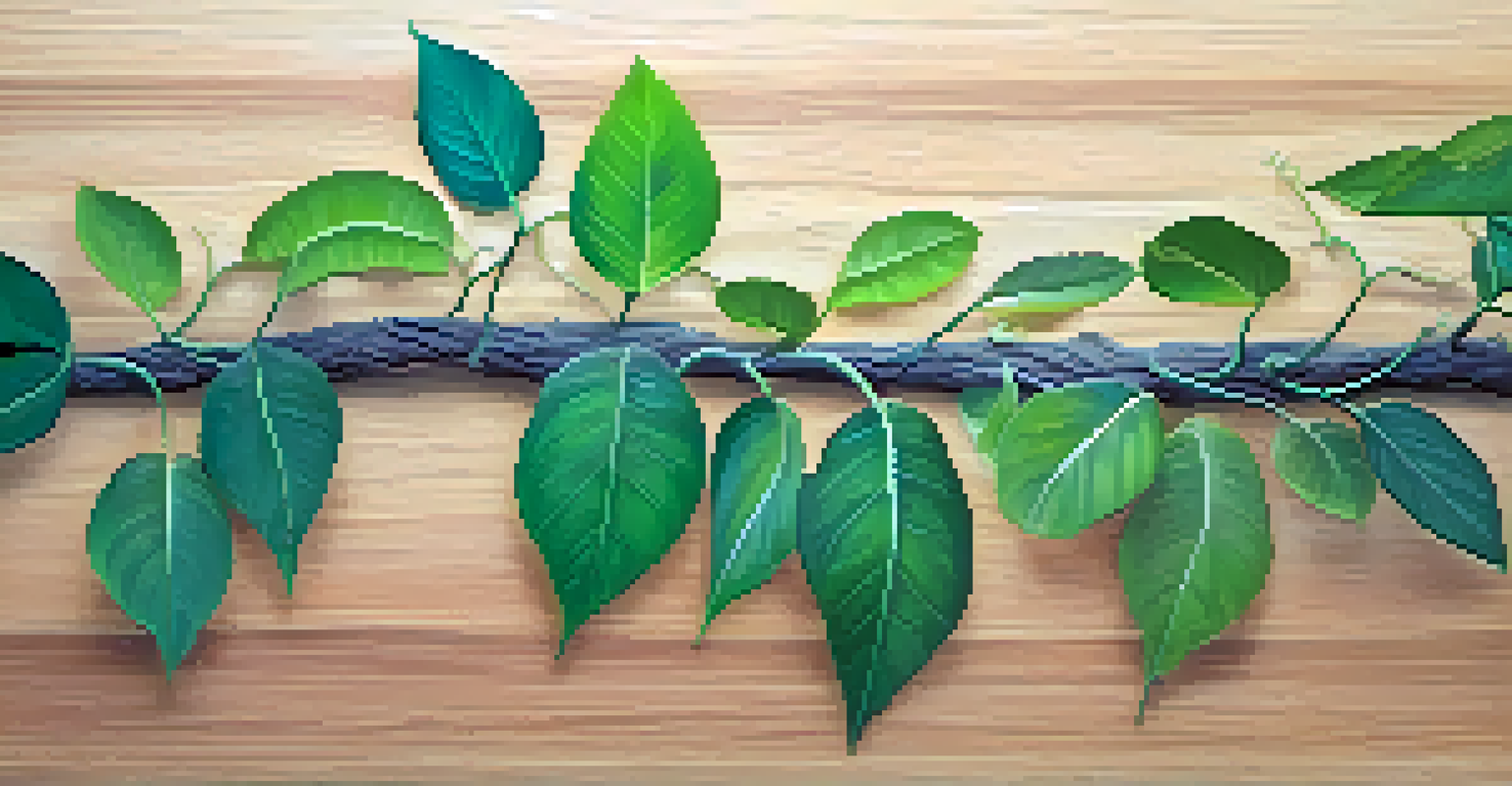Understanding Ayahuasca: Origins and Cultural Significance

What is Ayahuasca and Its Main Ingredients?
Ayahuasca is a traditional Amazonian brew made primarily from two plants: the Banisteriopsis caapi vine and the Psychotria viridis leaf. The combination of these ingredients creates a powerful psychoactive experience that has been used for centuries by Indigenous peoples. The brew is known for its ability to induce visions and deep introspection, often described as a journey of self-discovery and healing.
Ayahuasca is a powerful catalyst for personal and spiritual growth, leading many to confront their deepest fears and desires.
The magic of Ayahuasca lies not just in its chemical components but also in the way it is prepared and consumed during ceremonial contexts. These rituals are led by experienced shamans who guide participants through their experiences, fostering a safe environment for exploration. This communal aspect is crucial, as it emphasizes connection and shared understanding among participants.
In recent years, Ayahuasca has gained global attention, attracting individuals seeking alternative therapeutic approaches. However, it is essential to approach this powerful brew with respect and understanding of its cultural roots. Misunderstanding or misusing Ayahuasca can lead to both personal and community harm, highlighting the importance of responsible engagement.
Historical Roots of Ayahuasca in Indigenous Cultures
The origins of Ayahuasca date back thousands of years, primarily within the Amazon basin. Indigenous tribes, such as the Shipibo and Ashaninka, have long utilized this sacred brew in their spiritual practices. These cultures view Ayahuasca not only as a medicine but also as a means of connecting with the spiritual world and ancestral wisdom.

Throughout history, Ayahuasca has served various purposes, from healing physical ailments to facilitating spiritual communication. It's often ingested during rituals that mark significant life events, such as birth or death. These ceremonies create a sense of continuity between the past and present, reinforcing communal bonds among participants.
Ayahuasca: A Healing Brew
Ayahuasca, made from Banisteriopsis caapi and Psychotria viridis, is a traditional Amazonian brew known for its psychoactive properties and potential therapeutic benefits.
As modern society increasingly seeks alternative healing methods, the profound history of Ayahuasca offers valuable insights into how ancient practices can inform contemporary wellness. This intersection of tradition and modernity invites deeper exploration into the ethical considerations surrounding Ayahuasca's use outside its traditional context.
The Role of Shamans in Ayahuasca Ceremonies
Shamans play a pivotal role in Ayahuasca ceremonies, acting as spiritual guides and healers. Their extensive knowledge of the plants and their effects, combined with their cultural insights, allows them to facilitate meaningful experiences for participants. The shaman's presence provides a sense of safety, encouraging individuals to explore their inner worlds with guidance.
The shamans' wisdom is crucial in guiding participants through the complexities of their inner worlds during Ayahuasca ceremonies.
During ceremonies, shamans often chant icaros, sacred songs that are believed to invoke healing energies and spiritual protection. These songs not only enhance the Ayahuasca experience but also serve to connect participants with the spiritual realm. The rituals can vary widely depending on the shaman's lineage, the purpose of the ceremony, and the community's traditions.
The reliance on shamans underscores the importance of cultural context when engaging with Ayahuasca. As individuals seek out these experiences, recognizing and respecting the role of shamans can foster a more authentic and meaningful encounter with the brew and its traditions.
Ayahuasca's Impact on Mental Health and Well-Being
In recent years, research has begun to explore Ayahuasca's potential benefits for mental health. Preliminary studies suggest that the brew may help alleviate symptoms of depression, anxiety, and PTSD. Many participants report significant emotional breakthroughs and a greater sense of purpose following their experiences, leading to increased well-being.
The therapeutic potential of Ayahuasca is often attributed to its ability to facilitate deep introspection and emotional release. Participants often describe their journeys as cathartic, enabling them to confront and process unresolved traumas. This aspect of healing resonates with those seeking alternative treatments that differ from conventional therapy methods.
Cultural Roots and Modern Use
While Ayahuasca has deep Indigenous roots and is used in spiritual practices, its growing popularity raises concerns about cultural appropriation and ethical engagement.
While the promising benefits are encouraging, it's essential to approach Ayahuasca with caution. Individuals should consider potential risks, including the psychological impact of the experience and the necessity of a supportive environment. Engaging with trained professionals and understanding personal motivations can enhance the therapeutic journey.
Cultural Significance of Ayahuasca in Modern Society
Ayahuasca has transcended its Indigenous roots, becoming a symbol of spiritual exploration in modern society. As individuals increasingly seek deeper meaning and connection, Ayahuasca ceremonies offer a path to personal growth and transformation. This growing interest highlights the universal quest for understanding oneself and the world.
The popularity of Ayahuasca retreats and workshops has surged, attracting people from various backgrounds. These experiences often blend traditional practices with contemporary wellness trends, creating a unique fusion of cultures. However, this commercialization raises important questions about cultural appropriation and the ethical implications of using sacred traditions for personal gain.
To honor Ayahuasca's cultural significance, participants must approach these experiences with humility and respect. Engaging in open conversations about the brew's origins and its traditional uses fosters a deeper appreciation for its role in Indigenous cultures, ensuring that its sacredness is preserved amid the evolving landscape of modern spirituality.
Legal and Ethical Considerations Surrounding Ayahuasca
The legal status of Ayahuasca varies significantly across countries, often complicating access for those seeking its benefits. In some regions, it is embraced as a cultural heritage, while in others, it faces legal restrictions due to its psychoactive properties. Understanding these legal frameworks is crucial for anyone considering participating in Ayahuasca ceremonies.
Ethical considerations also play a pivotal role in the conversation surrounding Ayahuasca. As the brew gains popularity, the potential for exploitation of Indigenous knowledge and practices arises. It is vital to prioritize the voices of Indigenous communities and ensure that any engagement with Ayahuasca is done with their consent and respect for their traditions.
Role of Shamans in Ceremonies
Shamans serve as vital guides in Ayahuasca ceremonies, using their knowledge and cultural insights to facilitate meaningful and safe experiences for participants.
Navigating the legal and ethical landscape requires thoughtful reflection and a commitment to responsible engagement. By supporting Indigenous-led initiatives and seeking education about the brew's cultural significance, individuals can participate in Ayahuasca experiences in a way that honors its heritage and promotes sustainability.
Personal Stories: Experiences with Ayahuasca
Many people who have participated in Ayahuasca ceremonies share transformative stories that highlight the brew's profound impact. Some describe encounters with their inner selves, uncovering hidden fears and desires during their journeys. These narratives often reflect a common theme: the pursuit of healing and understanding in a chaotic world.
For instance, one individual recounted a powerful vision that led to forgiveness of past traumas, allowing them to move forward with renewed strength. Such personal stories not only illustrate the potential benefits of Ayahuasca but also emphasize the importance of preparation and integration following the experience.

While each journey is unique, these shared experiences create a sense of community among participants. They remind us that the search for meaning and healing is a universal human experience, bridging cultures and backgrounds through the shared pursuit of transformation.